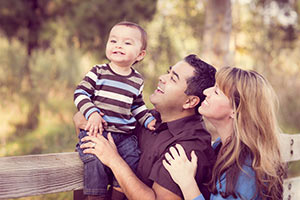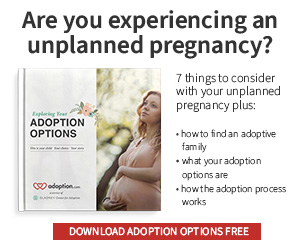ADOPTION IN
Washington

The Washington adoption options are available for those considering placing a child for adoption or adopting a child into their growing family. There are many reasons parents in all stages of life may consider placing or adopting a child in Washington. Your needs matter when it comes to the adoption process. An adoption agency can help you create an adoption plan that works best for you.
Adoption Near Me

Considering Placing Your Baby or Child for Adoption? You can learn more here or call an adoption counselor 1-800-236-7898.
Domestic Infant Adoptions can be completed through a Washington adoption agency or adoption attorney. Click here for a directory of adoption service providers in Washington.
International Adoptions must be completed through an adoption agency or adoption attorney. Find an international adoption service provider here.
Foster Care Adoptions in Washington can be completed through the Department of Social and Health Services.
Gallery of children waiting to be adopted.
Join the Washington adoption group in our community!
Looking for more resources in your area? Check out the Adoption Directory for a listing of adoption professionals in your state.
I’m considering placing my baby or child for adoption.
Pregnant and have questions? We can help answer your questions by telling us what works best for you.
Are you pregnant and considering adoption? Do you need help getting started?
Click here and help us understand what your needs are and the preferences you have. We can help you get started.
Washington Adoption
By: Samantha Flores
“There are times when the adoption process is exhausting and painful and makes you want to scream. But, I am told, so does childbirth.” – Scott Simon
It’s no secret, the adoption process can be a challenging and emotional time. There are many aspects to consider when placing a child for adoption. Sometimes, having all the information beforehand can help with making a decision and knowing if adoption is right for you.
What many don’t always understand is that the adoption process varies from state to state. While there are many similarities in the requirements, making sure you have your state’s adoption information will help make the process smoother.
What is Adoption?
When people think of adoption, they think of it as a way for others to grow their families. There are many reasons why a child is placed for adoption. Ultimately, all of those reasons come down to a choice that was made for the child to live a better life.
To put it in technical terms, adoption is a legal proceeding that creates a parent/child relation between persons not related by blood. The adopted child is entitled to all privileges belonging to a natural child of the adoptive parent, including the right to inherit.
When a child is legally adopted, he or she has legal rights as any biological child would have in a family. Not only will the child be accepted into a life of love, but they will also have a future where they are taken care of.
Thankfully, there are many ways families can experience adoption through open, closed, or semi-open adoption options.
Open Adoption
A popular choice when deciding to place a child for adoption is an open adoption. Open adoption is just as it sounds; open communication between the adoptive family and the birth family.
This communication can even begin during pregnancy. The potential adoptive family and the birth parent(s) learn about each other and establish a relationship. After the adoption of the child is complete, the birth parent is still allowed to communicate with the family and their child. The birth parent will be able to essentially watch their child grow up.
Open adoptions have been shown to enhance the parent/child relationship while helping the child understand their birth and adoptive families.
Closed Adoption
Quite the opposite of open adoption, closed adoption is an adoption where there is no communication between the birth parent(s) and the adoptive family. There are a variety of reasons why a closed adoption is chosen.
In a closed adoption, the birth parents are not able to receive any information about their child while they grow up. They are not privy to the child’s name following the adoption and they will not know where in the United States their child will live.
Semi-Open Adoption
A semi-open adoption is a way for the birth parent to keep updated about their biological child. However, there is no direct communication between the adoptive family and the birth parents.
Typically, the birth parents will receive pictures and information about their biological child through the adoption agency. The child’s whereabouts are not shared. This type of adoption is more popular than a closed adoption because it still allows the birth parents to see their child grow up from afar.
13 Facts About the Washington Adoption Process
The first step in choosing adoption for your child is to know the requirements, the process, and how adoptions are finalized. In the state of Washington, there are several steps to follow that might seem overwhelming. However, there are many adoption agencies in the state to assist you with the process and answer any questions you might have.
The following are the top 13 things you should know about the Washington adoption process. Use this guide to help you start to understand the process and make an educated decision about if adoption is right for you.
1. Who can adopt in Washington?
In the state of Washington, the following are requirements for any person seeking to adopt. Individuals must be:
- 18 years old or older.
- Legally competent.
- Pass a home study.
2. What is the first step to placing a child for adoption in Washington?
The first step would be to find an agency to go through for private adoption. The agency will provide you with all the necessary information to make the adoption process smooth.
Additionally, you may choose to contact the Washington State Department of Children, Youth & Families to find guidance from a state professional.
3. What rights do birth parents have?
Birth parents have the right to consent to the relinquishment of their parental rights before the child is born. However, the petition of consent will not be filed with the court until 48 hours after it is signed or 48 hours after the birth, whichever is later.
4. Can birth parents change their minds during the process?
In the state of Washington, consent is revocable any time before the petition is accepted and approved by the court. If it is determined consent was obtained fraudulently, it is revocable for up to one year. After one year, the petition is irrevocable.
5. Who must consent to the adoption?
An adoption cannot take place without the legal consent of the person(s) responsible for the child. Written consent must be provided by:
- The mother and any alleged father.
- An agency or department to whom the child has been relinquished.
- The child’s legal guardian.
- The child, if he/she is 14 years old or older.
Consent is not needed if it is determined that it is in the best interest of the child to relinquish parental rights.
6. Is there a payment for placing a child for adoption?
It is illegal for anyone to offer money or anything of value in exchange or to influence you to place your child for adoption. This law is valid in all of the United States. The state of Washington does allow for birth parents to have certain expenses paid for by the adoptive family, such as:
- Any prenatal or medical expenses relating to the child’s birth.
- Attorney fees and any court costs involved in transferring the custody of the child.
7. What documents are needed in the Washington adoption process?
In addition to the application for adoption, a prospective adoptive family must provide the following documents to be approved:
- Criminal history background check.
- Child abuse and neglect inquiries.
- Personal information*.
- Documentation of marriages and divorces, if applicable.
- Medical statements.
- Income/financial statements.
- References.
*Personal information includes the following documentation:
- Background and history
- Family facts (birthplace, parents, siblings, childhood, personality)
- Education
- Employment history and military service (if applicable)
- Values, goals, interests, and activities
- Cultural background
- Relationships
- Spouse/partner
- Children
- Others living in the home
- Parenting experience with children
- Family roles/activities
- Attitudes on parenting
- Experience and training
- Discipline
- Religious/spiritual affiliation and practices
- Medical and psycho-social
- General medical
- Abuse history
- Domestic violence
- Drug/alcohol
- Mental health/counseling
- Home and neighborhood
- Support systems
- Family financial
- Potential for permanency
- Concept of adoption as a lifelong developmental process and commitment
- Potential for a child to have feelings of identity confusion and loss regarding separation from birth parents
- The relevance of child’s relationship with siblings and potential benefit to the child providing a continuing relationship and contact with known siblings
- Disclosure of the fact of adoption to the child
- Child’s possible questions about birth parents and relatives
- The relevance of a child’s racial, ethnic, and cultural heritage
All of this information was found on the state of Washington’s Department of Children, Youth & Families services website.
8. What is a home study?
A home study is an evaluation process that assesses an adoptive family’s ability to provide a stable, safe, and nurturing environment for a child. The process in Washington contains an investigative approach. The adoptive family will be evaluated on their home environment, family life, health, and finances.
Additionally, the adoptive family must pass background checks, which include any prior convictions or charges against them, if applicable. There will also be a review of any child abuse and/or neglect history for any adult living in the home.
Interviews of individuals living in the home will be part of the home study process, to provide more insight into the adoptive family’s lifestyle.
A home study is generally approved within 90 days of receipt of the application.
9. How do adoptive parents pass the home study?
Applicants must pass background checks to pass a home study. A felony conviction on a record of an applicant in the following will permanently disqualify an applicant from the adoption process:
- Child abuse and/or neglect.
- Spousal abuse.
- Crime against children (including child pornography).
- A crime involving violence (including rape, sexual assault, or homicide).
Additionally, applicants will not be approved if there have been any convictions of the following within the last five years:
- Any other physical assault.
- Any other sex offense.
- A felony drug conviction.
- Any other felony conviction.
In the state of Washington, a home study must be completed by an agency, the department, a court-approved individual, or a qualified employee. Once a home study is completed, it must be filed with the court before any placement of a child in the home of the adoptive parents.
10. Is there an in-home visit for the adoptive family?
Yes, there will be an in-home visit from the licensor. Additionally, all adults and minor children will be interviewed to better understand the family’s lifestyle and family dynamic.
11. How long does the Washington adoption process take?
Most adoptions are able to be completed in about a year. There are some exceptions where adoptions could take up to two years to complete.
12. Is there a follow-up visit after the placement of a child?
Washington’s Department of Children, Youth, & Families will continue to visit the adoptive family’s home a minimum of once every 30 days until the adoption is finalized. The visits are to ensure the family is adjusting to their new addition in their home.
Additionally, the department may suggest at that time any additional training or other services needed to help the family be successful in parenting the adopted child. Court hearings continue at a minimum of every six months.
13. How do I know if adoption is right for me?
There can be countless research hours logged, dozens of educational material read, and several long conversations with others to help with the choice of placing a child for adoption. However, none of this seems to matter when the final decision is ultimately yours.
A decision to place a child for adoption stems from emotions and the love a parent has for a child. If adoption is right for you, know that you are making this decision with your child’s best interest at heart.
The Washington adoption process can be completed with guidance from professionals to ensure each step is completed accurately. Deciding to place a child for adoption is one of the bravest decisions a parent can make.
In Washington, the rights of the parents are the first thing to be considered. If adoption is voluntary, keep in mind that a 48-hour waiting period must take place after a child’s birth or 48 hours after the parents have signed the petition to consent to adoption (whichever comes later) before it is accepted by the court.
To recap, adoption can be revocable if it was determined that the consent to adoption was submitted fraudulently. After one year, adoption is irrevocable. While adoption can be emotionally draining, there are services birth parents can receive to help with the transition.
The measures put in place for the Washington adoption process are set to help provide the best homes possible for children. Parents placing their children for adoption can take comfort in knowing their biological child will be well cared for and their futures will be bright.
If you have questions or want to know more about the Washington adoption process, contact your local state agency office or a local adoption agency for further information.
Washington Adoption Guide
The information contained on this website is for educational purposes only and is not intended to be a substitute for professional legal advice. Always seek the advice of a licensed and qualified professional. While the content of this website is frequently updated, information changes rapidly and therefore, some information may be out of date, and/or contain inaccuracies, omissions or typographical errors.
Can I Adopt in Washington?
You must be at least 18 years old to adopt a child. Parents must complete preservice training called Core Training. You must complete a home study to be approved for adoption.
What Adoption Regulations Exist in Washington?
Advertising: Only licensed adoption agencies, authorized agents of the department, and parents with completed home studies may advertise for adoption. § 26.33.400(1)-(2)
Relinquishment: Birth parents may consent to an adoption before the child’s birth. In the case of indian children, parents must wait until 10 days after the child’s birth to give their consent. Consent is revocable at any time before the consent is approved in court. § 26.33.080; 26.33.160
Birth parent expenses: A person receiving a child for adoption is permitted to pay: birth related hospital fees, medical fees, and attorney fees. § 9A.64.030(2)(f)
Post-adoption contact agreements: Contact agreements are only legally enforceable in a written order approved by the courts. § 26.33.295
Birth father rights: The mother and unmarried father may sign an acknowledgement of paternity with the intent to establish the man’s paternity. § 26.26.300; 26.26.305
Finalization: The average time between TPR and adoption finalization in 2014 was 10.4 months.
Is Adoption Assistance Available in Washington?
Can I adopt a Child from another country?
It is always possible to adopt a child from another country, even if you live in the United States. Children under 18 adopted from a Hague Convention country entering the U.S. with an IH-3 visa may automatically receive U.S. citizenship.
Children adopted from a non convention country must qualify as orphans before receiving U.S. citizenship. When U.S. citizens finalize an adoption abroad, they must apply to the USCIS for an IR-3 visa for the child. An IR-3 visa classifies the child as an immigrant and may provide the child with citizenship upon arrival in the States.
Parents wishing to receive a US state birth certificate for their child must submit documentation from readoption or validation of a foreign adoption.
State Contacts
Gallery of children waiting to be adopted: https://adoption.com/photolisting?page=1&search_type=region&range=UnitedStates
State subsidy contact:
Melanie Meyer, MSW
Adoption Support Program Supervisor
P.O. Box 45713/
Olympia, WA 98504
Phone: 360-902-7567
Fax: 360-902-7903
Email: Melanie.Meyer@dshs.wa.gov
Summary
Adoptions in Washington can be completed through the Department of Social and Health Services.
You must be at least 18 years old to adopt a child. Parents must complete preservice training called Core Training. You must complete a home study to be approved for adoption.
Only licensed adoption agencies, authorized agents of the department, and parents with completed home studies may advertise for adoption. Birth parents may consent to an adoption before the child’s birth. In the case of indian children, parents must wait until 10 days after the child’s birth to give their consent. Consent is revocable at any time before the consent is approved in court.
Contact agreements are only legally enforceable in a written order approved by the courts.
Unmarried fathers may sign an acknowledgment of paternity in or to receive notice of adoption proceedings.
The average time between to finalization in 2014 was 10.4 months.










